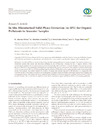Identificador persistente para citar o vincular este elemento:
https://accedacris.ulpgc.es/jspui/handle/10553/46296
| Campo DC | Valor | idioma |
|---|---|---|
| dc.contributor.author | Abaroa-Pérez, B. | en_US |
| dc.contributor.author | Sánchez-Almeida, G. | en_US |
| dc.contributor.author | Hernández-Brito, J. J. | en_US |
| dc.contributor.author | Vega-Moreno, D. | en_US |
| dc.date.accessioned | 2018-11-23T03:11:52Z | - |
| dc.date.available | 2018-11-23T03:11:52Z | - |
| dc.date.issued | 2018 | en_US |
| dc.identifier.issn | 2090-8865 | en_US |
| dc.identifier.uri | https://accedacris.ulpgc.es/handle/10553/46296 | - |
| dc.description.abstract | Solid phase extraction (SPE) is a consolidated technique for determining pollutants in seawater samples. The current tendency is to miniaturise systems that extract and determine pollutants in the environment, reducing the use of organic solvents, while maintaining the quality in the extraction and preconcentration. On the other hand, there is a need to develop new extraction systems that can be fitted to in situ continual monitoring buoys, especially for the marine environment. This work has developed a first model of a low-pressure micro-SPE (m-SPE) for persistent organic pollutants (POPs) that can be simply applied to in situ monitoring in the marine environment. This system reduces the volumes of sample and solvents required in the laboratory in comparison with conventional SPE. In the future, it could be used in automated or robotic systems in marine technologies such as marine gliders and oceanographic buoys. This system has been optimised and validated to determine polycyclic aromatic hydrocarbons (PAH) in seawater samples, but it could also be applied to other kinds of persistent organic pollutants (POPs) and emerging pollutants. | en_US |
| dc.language | eng | en_US |
| dc.publisher | 2090-8865 | - |
| dc.relation.ispartof | Journal of Analytical Methods in Chemistry | en_US |
| dc.source | Journal of Analytical Methods in Chemistry [ISSN 2090-8865], v. 2018 (7437031) | en_US |
| dc.subject | 2301 química analítica | en_US |
| dc.subject.other | Organic pollutants | en_US |
| dc.subject.other | Seawater samples | en_US |
| dc.subject.other | Solid phase extraction | en_US |
| dc.title | In situ miniaturised solid phase extraction (m-SPE) for organic pollutants in seawater samples | en_US |
| dc.type | info:eu-repo/semantics/Article | es |
| dc.type | Article | es |
| dc.identifier.doi | 10.1155/2018/7437031 | |
| dc.identifier.scopus | 85045734839 | |
| dc.contributor.authorscopusid | 57201689726 | |
| dc.contributor.authorscopusid | 57201687756 | |
| dc.contributor.authorscopusid | 35614212100 | |
| dc.contributor.authorscopusid | 14060992600 | |
| dc.identifier.issue | 7437031 | - |
| dc.relation.volume | 2018 | - |
| dc.investigacion | Ciencias | en_US |
| dc.type2 | Artículo | en_US |
| dc.date.coverdate | Enero 2018 | |
| dc.identifier.ulpgc | Sí | es |
| dc.description.sjr | 0,399 | |
| dc.description.jcr | 1,589 | |
| dc.description.sjrq | Q2 | |
| dc.description.jcrq | Q3 | |
| dc.description.scie | SCIE | |
| item.fulltext | Con texto completo | - |
| item.grantfulltext | open | - |
| crisitem.author.dept | GIR Tecnologías, Gestión y Biogeoquímica Ambiental | - |
| crisitem.author.dept | GIR Tecnologías, Gestión y Biogeoquímica Ambiental | - |
| crisitem.author.dept | Departamento de Química | - |
| crisitem.author.orcid | 0000-0002-5305-1667 | - |
| crisitem.author.orcid | 0000-0002-4993-4694 | - |
| crisitem.author.parentorg | Departamento de Química | - |
| crisitem.author.parentorg | Departamento de Química | - |
| crisitem.author.fullName | Hernández Brito, José Joaquín | - |
| crisitem.author.fullName | Vega Moreno, Daura | - |
| Colección: | Artículos | |
Citas SCOPUSTM
10
actualizado el 08-jun-2025
Citas de WEB OF SCIENCETM
Citations
8
actualizado el 18-ene-2026
Visitas
71
actualizado el 10-ene-2026
Descargas
50
actualizado el 10-ene-2026
Google ScholarTM
Verifica
Altmetric
Comparte
Exporta metadatos
Los elementos en ULPGC accedaCRIS están protegidos por derechos de autor con todos los derechos reservados, a menos que se indique lo contrario.
